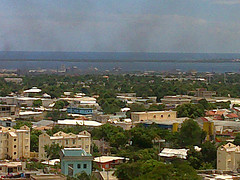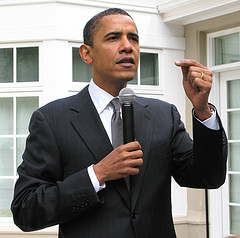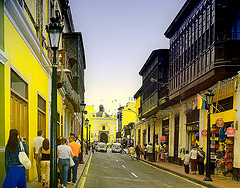
Latin America: Week in Review
Violence In Jamaica Continues As Police Hunt For Christopher “Dudus” Coke
May 26, 2010 By Staff

Police clashed with suspected supporters of Christopher "Dudus" Coke. Image taken on Monday.
Today in Latin America
Top Story — At least 31 people have died during an anti-drug offensive in Kingston, Jamaica’s Tivoli Gardens district and Jamaican Prime Minister Bruce Golding has vowed to restore order. The violence has been sparked by a manhunt for Christopher “Dudus” Coke, who is wanted in the United States on drug and gun trafficking charges.
Golding said he regretted the loss of life in the West Kingston neighborhood, but vowed keep looking for Coke and other suspects.
“We are facing a crisis … The measures are extraordinary, but they are extraordinary responses to extraordinary actions taken by some,” Golding told parliament, according to Reuters.
Jamaican police say they have detained more than 200 people and seized arms and ammunition, but fighting still continues between supporters of Coke and law enforcement. At times, the fighting has blocked off the road to Kingston’s airport and forced some flights to be cancelled.
Coke has attained Robin Hood-like status through much of West Kingston, due to his use of a mix of violence, charity and corruption. Much of the unrest in Kingston stems is between those who want him extradited and those who see him as a benefactor and philanthropist.
Coke also is rumored to have ties to the governing Jamaica Labor Party, which allegedly uses Coke’s gunmen to intimidate election rivals in Tivoli Gardens.
Some see the violence in Kingston as a way to put Jamaica on a path to reform. “I think it certainly has been a wake up call for the entire country,” said Peter Bunting of the opposition People’s National Party, according to the Associated Press.
The Jamaican government has issued a month-long state of emergency and about 10 percent of the capital is cordoned by security forces.
Just Published at the Latin America News Dispatch
- Alison Bowen blogs about President Obama’s pledge to send 1,200 National Guard troops to the U.S.-Mexico border, in the latest installment of Beyond Borders.
- Police appear to be making strides toward containing drug trafficking violence in Rio de Janeiro. Find out why in this Dispatch.
- A special report on Colombia’s DAS intelligence service’s plan to disinform the public, impede political opposition and intimidate the country’s citizens.
Headlines from the Western Hemisphere
North America
- The Obama administration announced that it will send up to 1,200 U.S. troops to help secure the U.S.-Mexico border and is requesting an extra $500 million in funding, in an action to help curb illegal immigration and drug violence, according to U.S. officials.
- Mexican pop singer Reyli Barba indefinitely postponed a benefit concert in the northern city of Monterrey, citing concerns about recent violence there.
Caribbean
- The Cuban Permanent Mission to the United Nations ratified Tuesday the country’s interest in strengthening cooperation and friendly ties with all African peoples.
- Cuban lawmakers denounced Arizona’s new immigration law, calling it “racist and xenophobic” as well as a “brutal violation of human rights.”
- A resort in the Dominican Republic is preparing for a world summit on Haiti’s future.
- A student strike at the University of Puerto Rico, which began on April 21 over austerity measures that university officials sought in order close a massive budget shortfall, has paralyzed much of the island.
Central America
- An American woman was arrested at Guatemala City’s La Aurora International Airport carrying nearly $420,000 in undeclared cash to Ecuador.
- El Salvador’s president Mauricio Funes said there will be a meeting of Central American leaders in July to discuss allowing Honduras back into the Central American Integration System.
- Honduran President Porfirio Lobo began a visit on Peru Tuesday after making a stop in Colombia, during his first Latin American tour.
- Costa Rica’s congress voted to give itself a 60 percent pay raise. Congress members’ salaries will rise to about $8,400 a month.
- Local indigenous people in Panama’s Darien region are being forced to act as guides and mules by Colombian drug-traffickers and rebels.
Andes
- The Colombian peso fell for the first time in three days, due to rising concerns over Spain’s hurting banks that could signal a widening European debt crisis.
- In an effort to expand his online presence, Venezuelan President Hugo Chavez has launched a website that includes his blogs and columns by Cuba’s Fidel Castro.
- A U.S. citizen, who has been imprisoned in Peru for the last 15 years for aiding MRTA guerrillas, may be paroled and deported soon, according to the country’s justice ministry.
- Bolivian President Evo Morales signed a law allowing him to suspend regional opponents from office if they’re accused of a crime.
Southern Cone
- Seven Latin American leaders were present in Buenos Aires as Argentina celebrated its national bicentennial Tuesday.
- Paraguayan President Fernando Lugo said that the military’s presence in northern Paraguay would continue after he lifted a 30-day state of emergency to combat the Paraguayan People’s Army Monday.
- Lawyers for a Polish priest in Brazil accused of sexually abusing a 16 year-old requested the priest’s release Tuesday, pending trial.
Image: Airborneshodan @ Flickr.
Subscribe to Today in Latin America by Email





